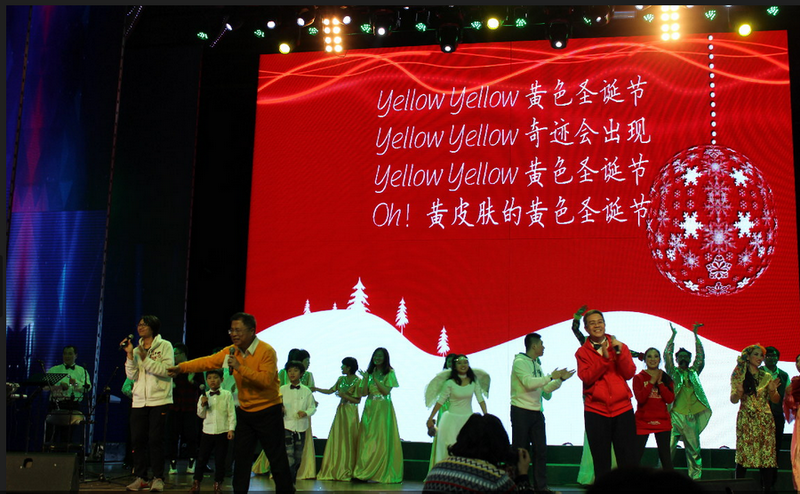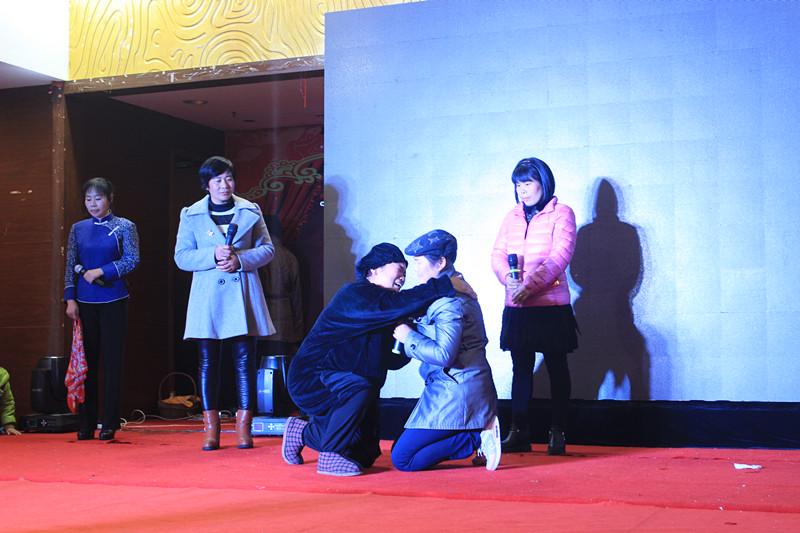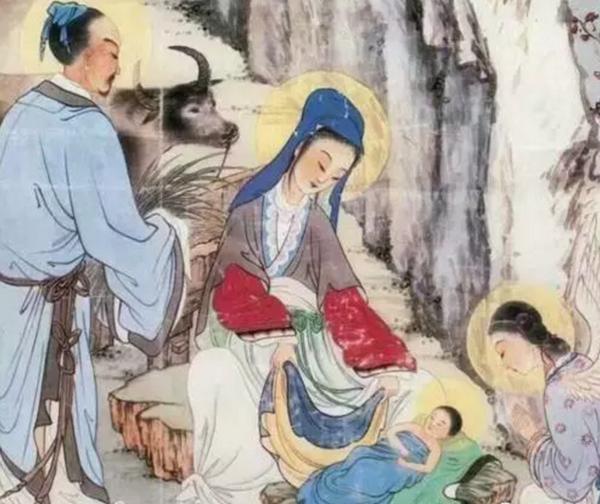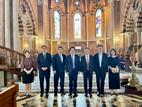Bethlehem, the birthplace of Jesus 2000 years ago, is an oriental city. However, Apostle Paul evangelized through Europe later on. The Hellenism and Romanization of Christianity also added western elements to the religion.
As a result, many Chinese think that Christianity derived from the western countries. We have five thousand years of traditional Chinese culture. However, we encountered the shock and colonialism of Western culture in modern times. So we have a particularly strong feeling that Christianity is a foreign religion.
China has been integrated into the world and gone through modernization since the reform and opening up. However, sometimes Christmas faces an embarrassing situation in China nowadays. In the eyes of some Chinese, Christmas is like a white wedding dress, which is western style. When Christmas comes, the whole society is filled with strong commercial atmosphere.
Compared with Chinese New Year, Mid-Autumn Festival, Dragon Boat Festival and other traditional Chinese festivals, Christmas is a symbol of Western cultural invasion. For the vast majority of non-Christians in China, Christianity is only related to Christianity and shopping. As a result, Christmas has been resisted in China for several times in recent years. With the spread of the network, the trend of resistance is intensifying.
Ten doctors from ten well-known China's universities including Beijing University and Tsinghua University jointly published an article online on Dec 21, 2006, to call for the resistance of Christmas. They encouraged Chinese to abandon cultural collective unconscious and insist the subjectivity of Chinese cultural.
The topic of celebrating Christmas seems to appear every year. A social commentator called Ma Liming said that the group who boycott Christmas has ranged from the ten left-wing cultural scholars to cultural conservatives. Laid-off workers, farmers, young students, and veterans are also included.
"2016 is a year against the tide of globalization. Black swan events continuously come out. Several individuals and organizations against Christmas emerge online. Even some teenagers who were born after 2000 also joined the trend. "Ma Liming wrote down his observations.
Under this background, Christmas has become a symbol which stands for overseas culture. Even Chinese who celebrate the festival also think so. Few people are concerned about how Chinese Christians should celebrate Christmas under their own cultural background? In fact, Chinese Christians have always been committed to making this traditional Christian festival more localized in China.
The efforts of Chinese Christians to localize Christmas
The programs designed by Chinese Christians to celebrate Christmas always include the birth of Jesus, testimonies of believers and calling of pastors. What's more, they have added traditional Chinese culture to these programs, which is down to earth.
The most typical programs are gospel crosstalk, comedy, allegro and skits, especially in the rural church. These performances are adapted from real stories in life, telling audience how to honor parents, handle the relationship between lovers and so on. The family ethics drama style performances instruct people how to solve some practical problems. We can also see this type of Christmas programs in some churches made up of workers in China's one-tier and second-tier cities.
What's interesting, some programs performed by students and white-collar workers can also be seen in some new city churches. "Today I am going to perform a crosstalk. The crosstalk pays attention to talking, singing, amusement and imitating. "
On the Christmas Eve of 2016, two Christians from Beijing Zaidao Church, a family church performed a self-directed comic "Who will release the heavy burden on my shoulder?". The comic shows different kinds of pressure faced with middle-aged people in modern city life, which is both amusing and educational.
How can the middle-aged get rid of the pressure? Drinking? Playing mahjong? Going to bed? These are not the solution. Instead, they make things worse sometimes. The program suggested that we could pray to Jesus.
In addition, the middle-aged and old female Christians in the church of rural-urban fringe zone like performing fan dancing at Christmas party. Fan Dancing is one of the traditional folk dancing of the Han nationality with several thousand years of history. When the traditional dancing met with hymns, the party was lighted up. The grandmothers put on the costumes of the Yangko dance (a kind of traditional folk dancing in north China) and carry baskets while dancing.
The Christmas party of many Chinese churches has inherited the style of traditional Chinese Spring Festival Gala broadcast on CCTV every year. The party will be host by two men and two women wearing canonicals. The program list also includes some modern-style performances. The Christmas is not just Westerners', it also belongs to the Chinese.
At the end of the Christmas party in a house church of Beijing, Christians always sing " Yellow Christmas" together, which is the classic of a Chinese Christian artist Huang Guolun. The song combines modern pop style melodies and lyrics, expressing Chinese Christians' true understanding of Christmas. The song is filled with confidence of Chinese Christians:
"When I was young I dreamed of a snowy Christmas.
I waited at bed for the appearance of Santa Claus.
Day after day, year after year.
I did not see anything.
Oh, white Christmas, my childhood fantasy,
White White Christmas, White White Christmas.
I broke up with her in that rainy December.
I sat in the church singing Christmas Eve with tears in my eyes.
The choir sang the song again and again. I feel a little comfort.
Oh, crossed in love, Blue Christmas
Blue Blue Christmas, Blue Blue Christmas
Until now I can enjoy the taste of Christmas
Which is the most beautiful gift given by God
Christmas is the sunshine in this cold world
Oh! Warm and yellow Christmas
Yellow, Yellow, Yellow Christmas
Yellow, Yellow, a miracle will appear
Yellow, Yellow, Yellow Christmas
Belong to yellow, yellow, yellow skin!
Celebrating Christmas is not just dancing and shopping
We shall be concerned about the sufferings of the world
Just like Jesus sacrificing everything without any complaint
OH Wonderful God! Yellow Christmas!"
Christmas localization doesn't mean Jesus was born in Zhumadian
When it comes to localization, we will think of a phrase "Chinese Christmas." Chinese celebrate Christmas in Chinese style. The Washington Post in the United States has published Westerners' observations of "Chinese-style" Christmas in 2012.
The Chinese Christmas is both fascinating and confusing. For example, the apple packaged in an innovative way is a popular gift at Christmas in China. The Chinese pronunciation for apple is like that of peace. Some fruit shops will print Christmas blessings or Santa's image on the apple. Santa Claus is regarded as a Christmas mascot in China who often plays saxophone.
The efforts made by Chinese Christians to localize Christmas can make us better understand the image of Christianity in China. This orientation of Christmas localization also reflects the thinking and attitude of Chinese Christians. They carefully deal with the tension between the core and the localization of Christmas.
Just after 2016 Christmas, a picture about the birth of Jesus was released on the Internet. The message of the picture is "Jesus was born in Zhumadian" with the title "Persisting in localizing Christianity in China". Some Christians have found this passage is from the Pangtzu of Henan (a kind of Folk Opera) "Jesus baby". The whole opera is as follows:
Little Jesus was born in Zhumadian three days after the winter solstice.
The Three Magi brought about apples, pork and flour
Maria had a red egg in her hand and Joseph was busy making the dumpling.
The shopkeeper handed out a bowl of ginger water to prevent Maria from getting cold.
The party secretary of Zhumadian heard the news and said Hallelujah.
However, the temporary residence permit is still necessary.
The night sky is getting darker and everyone in the barn eats apples for peace.
Red flags flutter in every household of Zhumadian.
They celebrate Christmas with firecrackers and drums.
A Christian WeChat public account published an article named "Jesus was born in Zhumadian? Is this the localization of Christianity? " According to the article, most of the believers cannot accept the opera. The aim of localization is to better preach the gospel. The historical facts and fundamental issues cannot be assimilated.
Yet we should think of the acceptance and expression of natives and make appropriate adjustments. For example, when explaining to the Africans 'Your red sins will be as white as snow' (Isa. 1:18), we should use salt instead of snow because Africans have no concept of snow.
However, we shouldn't change the contents of the Bible. Even when we translate the Bible into African language, we should still point out "white" to emphasize the magical power of Christianity. The interpretation can be 'contextualized' to some extent for better understanding.
The Pangtzu, 'Jesus Baby', has crossed the boundaries of 'localization' and 'contextualization' because it has changed the basic facts. All the contents of the song are fabricated except the names, which is more lethal than pure fiction. Nobody will take pure fiction seriously. However, these half-genuine and half-sham contents will make people confused and reduce the reliability of truth.
Translated by Emma Ma















